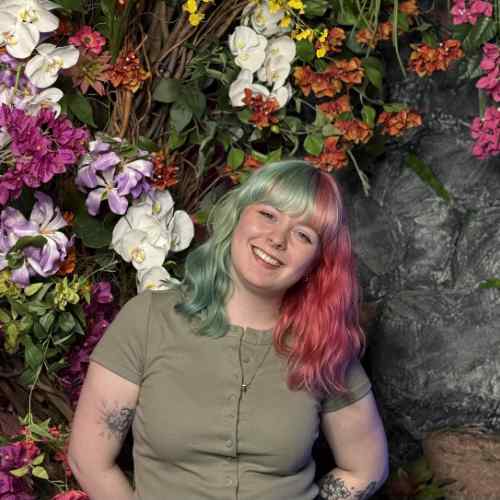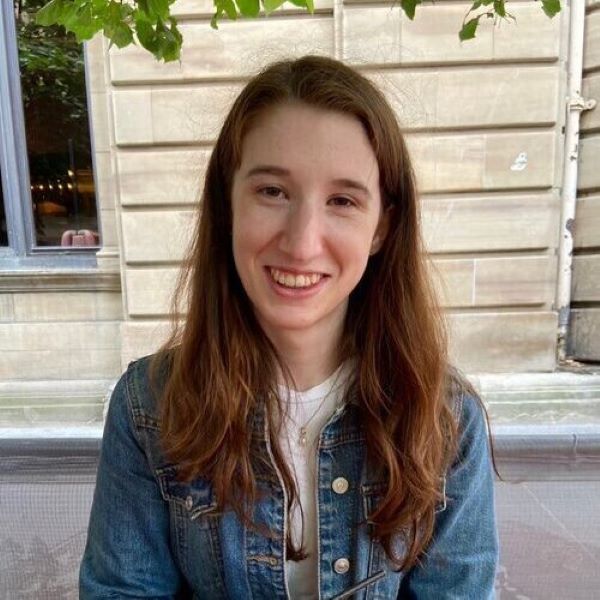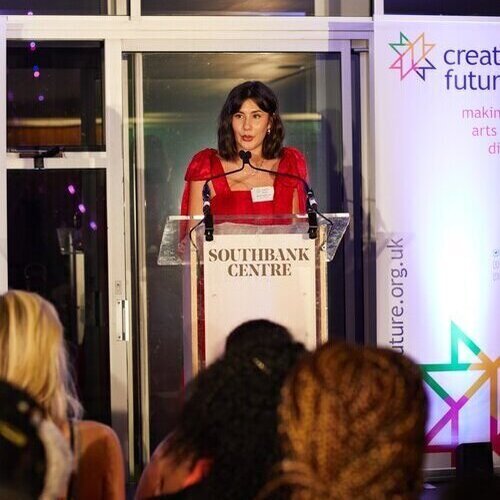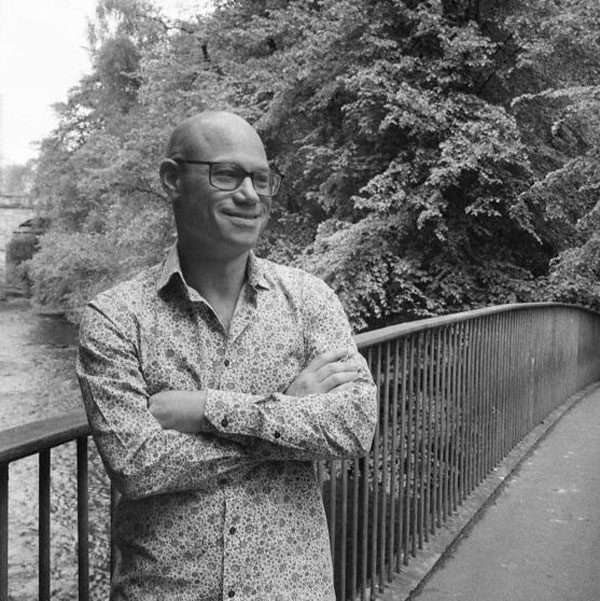MLitt Creative Writing
ApplyKey facts
- Start date: September
- Study mode and duration: Full-time: 12 months
Part-time: 24 months
Study with us
- work closely with experienced, published writers who know the industry to develop your writing practice
- benefit from workshops with peers and tutors while developing your ideas
- work on an extended creative project developed on a one-on-one basis with your tutor
- prepare for the practical side of literary development
- experiment with new and hybrid forms
- work in a dynamic, artistic city full of history and possibility
The Convenor of the MLitt in Creative Writing is novelist and literary scholar Dr Jessica Widner, author of Interiors.
The Place of Useful Learning
UK University of the Year
Daily Mail University of the Year Awards 2026
Scottish University of the Year
The Sunday Times' Good University Guide 2026
Why this course?
This course is designed across three semesters, with each class intended to develop not just the skills aspiring writers need, but the right skills at the right stage in their development. The structure of the MLitt gives writers the freedom to pursue their chosen forms and genres in terms of their creative work, while providing guidance and support in an academic context too. The staff team aim for a collegiate, supportive atmosphere – we aren’t just a writing course, we’re a writing community.
Strathclyde staff can offer specialist tuition in a wide range of genres including:
- contemporary fiction & non-fiction
- historical fiction & fiction for young adults
- screenwriting
- poetry


Interested in postgraduate study?
At the Faculty of Humanities and Social Sciences, our friendly and knowledgeable team will be available to provide you with all the information you need to kick-start your postgraduate journey at the University of Strathclyde. Register for upcoming events below:
Course content
Part-time structure
First Year: 1 Semester 1 class plus 2 Semester 2 classes
Second Year: 2 Semester 1 classes plus 1 Semester 2 class + The Major Project in Semester 3
Or
First Year: 2 Semester 1 classes plus 1 Semester 2 class
Second Year: 1 Semester 1 class plus 2 Semester 2 classes + The Major Project in Semester 3
Each 20 credit module (all but the 60-credit Major Project at the end of the course, Semester 3, second year of the part-time route) is 200 hours of study, 20 of which are class time. The rest of the time is reading, research, and writing assignments. All classes are currently scheduled for weekdays, between 9am and 5pm, though in each Semester classes almost exclusively take place on Tuesdays and Wednesdays. Optional modules may take place at other times.
Semester 1 contains three modules of equal weight. All three are scheduled on the same day of the week. This Semester has a heavy emphasis on teaching core principles, providing students with opportunities to develop essential writing skills. We also encourage students to explore potential exciting directions for developing their work over the year to come.
Core classes
The Shape of Stories 1 (20 credits)
The Shape of Stories 1 works with the bones of good stories across genre and form, resembling a seminar in format. This class introduces you to classic and contemporary writers and writing approaches that will be useful in future work. It also includes workshop time to share work with your peers and benefit from editorial feedback from tutors who are also published writers. We're mindful from day one that you're working towards the Major Project of your final Semester. The first semester is the time for planning and experimentation that will later be useful when tackling that Major Project.
The Writing Life (20 credits)
The Writing Life is all about the contemporary literary landscape. It introduces you to the practicalities of a life in the creative industries – how writers make a living, and how that living is changing in the 21st Century. Through a series of talks and seminars from visiting speakers from across the writing worlds, you'll have direct access to those who have been there and done it. In assignments, you'll choose a target, for example, a publisher, a journal, an online magazine – then write a new piece of creative work to submit to that target, as well as an essay profiling the target they have chosen. This ensures you increase knowledge of the publishing industry you wish to enter while also having a practical challenge, writing to a brief you've chosen.
The Writer's Studio
The Writer's Studio is a student-led class. By this we mean that students who take this option are free to choose the focus, research area, genre and form of their work.
The ‘advanced topic’ you select will be the beginning of a conversation with your tutor about the kind of work you wish to produce for the module. Independent research is key, as is robust debate with your tutor and classmates about the direction, nature and rigour of the project. You'll work in editorial groups and pairs, as well as with the tutor to develop your work over the course of the semester.
Being placed in Semester 2 alongside The Shape of Stories 2 and The Made Project for all Creative Writing students who select it, The Writers' Studio is designed to complement the experimentation encouraged in the other two Creative Writing modules at this point in the MLitt in Creative Writing. It may also provide good preparation for The Major Project in Semester 3, acting as a research basis for future creative work.
In Semester 2, the MLitt starts encouraging students to engaging in more towards independent work. The modules become more student-led, with both core modules providing greater freedom in contrasting ways.
Core classes
The Shape of Stories 2 (20 credits)
The Shape of Stories 2 is a partner to The Shape of Stories 1, the Semester 1 workshop focused on the bones of good stories across genre and form. This module takes that a step further, exploring hybrid writing across fiction, script, screenwriting, poetry and creative non-fiction, closely studying innovative contemporary works that blur the boundaries between different kinds of writing. You'll broaden your reading and experience, and will be encouraged to experiment with hybrid forms in your own creative work. From short stories containing to poetry, from ekphrastic responses to art and photographs to autobiographical, illustrated vignettes, The Shape of Stories 2 is an opportunity to explore new possibilities, in exciting ways.
The Made Project (20 credits)
The Made Project encourages experimentation across literary forms, genres and media, with opportunities to work collaboratively or individually on a substantial project. This course adds diversity to your writing portfolio, while also developing core researcher skills in organisation, engagement and project management. From editing to publication, archival visits to web design, adaptation to broadcasting and performance, this is an eclectic module which offers the chance to work creatively with new approaches, methods and materials.
Building on The Writing Life module in semester one, you'll apply critical and practical skills to a ‘made project’ which shows awareness of its readership/audience, literary contexts, process and potential circulation. Classes will involve student-led planning sessions and peer feedback, a field trip, visiting speaker, small group work, podcast training and supervisions.
The Made Project consists of two assignments: a short oral presentation in response to a creative brief, and a final ‘made project’ developed in discussion with your course tutor over a number of weeks, with an accompanying craft essay which reflects on the process and outcomes of the assignment. Previous made projects have included works such as short films, handmade books, graphic novels, a recipe book, a deck of tarot cards, ekphrastic works and visual poems. You'll also be involved in editing and publishing our in-house literary magazine, The Strathclyde Review.
A module from a selection offered from across the Department of Humanities
Students will be able to choose from a series of elective modules from both English & Creative Writing, and the Department of Humanities, based on availability and demand in any given academic session. Some of these may offer the opportunity to do creative assignments.
Below are examples of optional modules that our MLitt students have produced creative assignments for:
Contemporary Scottish Cultural Studies
This class allows you to engage with materials from Scottish, cultural, historical and literary studies. You'll read a range of primary literary and cultural materials in a historical and theoretical context, and will develop skills in textual analysis and critical engagement. In doing so, the class will provide knowledge of some of the main developments in Scottish literary and cultural studies throughout the 20th Century. You'll gain an understanding of the relationships between literature, culture and theories of nationalism, also developing an awareness of a range of major issues in contemporary Scottish culture.
Transcultural Fandom & British Popular Culture: Reading & Writing in Online Communities
This Masters option explores online fanfiction and fan communities and investigates how they work with and transform key popular texts and genres from British literary history. We'll study reading and writing practices and consider questions of adaptation across cultures, in relation to texts and themes which may have a global presence across different forms of media. Fan studies is a growing area within media/cultural studies, and fanfiction studies is rapidly developing as a new field of exploration for literary scholars. We'll read cutting-edge, as well as. canonical critical works in fan studies, and consider through this class how this field is developing and what new directions are emerging for research and scholarship. Students on this class are welcome to choose their own topics to explore, outwith the texts specifically covered in our classes.
This class is suitable for anyone interested in learning more about transformative works and fan cultures: no prior knowledge of fanfiction or experience with fan culture is necessary. For students with a background in English studies and Creative Writing, it features questions about literary genre and form, about online writing communities and their readers, and about the global re-interpretation of British culture and literature. For students primarily focused on 'TESOL and Intercultural Communication', it offers opportunities to consider how fan communities enable language learners and use particular kinds of intercultural communication through shared knowledge of and admiration for a 'canonical' work. For students with a background in gender studies, fanfiction and fan cultures supply an extraordinarily rich source for investigating how gender is depicted, discussed and debated by a very large cohort of predominately female-identifying or LGBTQ+ fans.
Fleshy Histories: Meat Eating & Meat Avoidance, 1500 to the Present
This class will engage students with literary and historical materials, and with theoretical work from animal studies and ecofeminism. This will inform discussions about the place, meaning and function of meat eating and meat avoidance, and debates about human-animal relations, from the early modern to the modern world.
As well as philosophical and religious work you'll read a range of primary materials, including literary works from A String of Pearls (aka Sweeney Todd) to Roald Dahl’s Pig; from Swift’s Modest Proposal to Coetzee’s Lives of Animals, via Dracula, and develop skills in textual analysis and critical and theoretical engagement.
English & Creative Writing Research Placement
The English & Creative Writing Research Placement class provides an opportunity to gain practical, research-based experience in an area where you can apply literary critical and/or creative writing experience and knowledge in a setting that is professionally relevant to you. The class is a one semester 20 credit class, undertaken in second semester, which equates to around 100 learning hours overall (this includes travel time to and from placement, assessment preparation, and attendance at campus supervisions). By the end of the class, you should be able to:
- Demonstrate an understanding of the relationship between Interdisciplinary English Studies or Creative Writing and the operations of a specific organisation working in a relevant field within Scotland
- Reflect critically on issues of language and communication, representation, and narrative within an organisation
- Articulate the transferrable skills developed through their Masters degree to potential employers
- Produce a piece of research to a specific brief
- Gain experience in collaboration through working within a partner organisation
- Gain communication skills and be able to present their research findings to a range of audiences within and outwith academia
This class will provide you with an opportunity to build your portfolio of experience and develop personal and professional skills that are relevant to gaining employment and/or further study. Please note that all placements have to be arranged during first semester, and approved by early December. Please contact Dr Eleanor Bell (eleanor.bell@strath.ac.uk) for more information.
Semester 3 starts after the Easter break in each academic year, and runs until students submit their final piece of work in mid-August. Whereas Semesters 1 and 2 are built around classes, seminars and group work, Semester 3 is all about one-on-one supervision and independent writing.
The Major Project (60 Credits)
The only module in Semester 3 is the triple module we call The Major Project. This is an extended piece of creative work in students’ chosen field, that they will develop with a supervisor who will get to know them and their work closely.
The process starts with students sending an outline of their planned project for discussion with staff, before a supervisor is assigned to work with students regularly over the summer. This is the time for more focussed work on the page, and closer editing.
Using the skills acquired in Semesters 1 and 2, students will now be fully independent researchers, ready to pursue their signature work which is intended to be a potential submission to an agent or publisher. Whatever form it takes, when students leave us, their work will be ready to present to the world at large. Novelists will make serious headway into their manuscript; poets and essayists and short story writers will amass the beginnings of a collection; screenwriters will have a full draft of a feature film or series pilot.
Assessment
You'll submit creative work for formal assessment in each of the core workshops. This will take the form of short fiction, poetry or playwriting, depending on the student's chosen area of specialisation.
The creative writing skills project will involve students selecting a topic covered during the skills workshop and developing a project in discussion with tutors on a one-to-one basis. The form of assessment for this component will be dictated by the nature of the skills project.
The final dissertation will take the form of an extended piece of creative writing (fiction, poetry or playwriting) and build on work developed in one of the two creative writing workshops. It will be developed in discussion with tutors on a one-to-one basis.
MLitt Creative Writing Prizes
The Keith Wright Prize for Excellence in Creative Writing
The Keith Wright Prize for Excellence in Creative Writing is an endowed fund created in memory of Dr Keith Wright, a poet and early member of the English Faculty at Strathclyde, by his family.
This prize, valued at £400, will be awarded annually to the student who achieves the highest overall grade in the MLitt in Creative Writing. It is the hope of Keith's family members that the money will help support the winner's writing career, perhaps by, for example, going towards time spent at a writing retreat or childcare that would allow the winner more time to write.
The Brian Hamill 'Common Breath' Award
The Brian Hamill 'Common Breath' Award memorialises Brian Hamill, a much-loved, Glasgow-based writer and publisher. This prize is named after Brian's press, The Common Breath, which aimed to champion not only established Scottish writers but also to spotlight emerging, unknown voices too, "finding and promoting and showcasing new and marginalised writing."
Each year we award the 'Common Breath' award, valued at £50, to a writer on the MLitt who has shown exceptional commitment to improving their work over the course of the year.
The Michelle Smith Scholarship
This scholarship honours the memory of Dr Michelle Smith, literary scholar, poet and author, who passed away in 2025.
We will be awarding the inaugural Michelle Smith Scholarship in 2026 to a full or part-time student currently enrolled in the MLitt in Creative Writing who has both demonstrated academic excellence during the first half of the programme and who is experiencing significant barriers to continuing their education.
This scholarship will help support the recipient throughout the writing of their dissertation, allowing them to allot more time and resources towards their writing.
The recipient of the Michelle Smith Scholarship will be awarded £5000 to use as they wish. It is the hope of Michelle’s family and friends that the award will go towards supporting the recipient’s writing career. The recipient of the Michelle Smith Scholarship will be awarded £5000 to use how they wish. It is the hope of Michelle’s family and friends that the award will go towards supporting the recipient’s writing career.

Winning the Brian Hamill Common Breath Award is like finding that needle in the haystack, unexpected and euphoric. I believe the support from the community of writers that the course and staff so ardently fosters contributed to my winning this award because if it weren't for them, I don't think I'd have become the writer, or person, I am today — for that, I am profoundly grateful.
Chat to a student ambassador
If you want to know more about what it’s like to be a Humanities & Social Sciences student at the University of Strathclyde, a selection of our current students are here to help!
Our Unibuddy ambassadors can answer all the questions you might have about courses and studying at Strathclyde, along with offering insight into their experiences of life in Glasgow and Scotland.
Our Creative Writing community

Kathryn Sandilands
Graduate
The course provided a lot of freedom in terms of the creative writing which students were able to produce for assignments, with workshops focusing on tools and approaches which might help to achieve a final piece of writing.

Hannah Lee
Graduate
I think the vast range of things that we were taught across the Masters degree was one of the things I enjoyed most about the course. I was encouraged to try many different forms of writing that pushed me out of my comfort zone but in the long run made me a better and more rounded writer.

Dr Rodge Glass
Course Convener
Read widely, think deeply, research thoroughly and revise closely, and you'll have a great time. Writing is a way of engaging with the world while trying to make sense of it. And the skills you learn will be useful whether you go on to work in the writing or publishing industries or not.
Entry requirements
| Academic requirements | A second-class Honours degree, or International equivalent, in any subject, plus a portfolio of creative writing. The submission of a satisfactory entry portfolio of creative writing. This should consist of one of the following:
|
|---|---|
| English language requirements | Please check our English requirements before making your application. |
Pre-Masters preparation course
The Pre-Masters Programme is a preparation course held at the University of Strathclyde International Study Centre, for international students (non-UK/Ireland) who do not meet the academic entry requirements for a Masters degree at University of Strathclyde.
Upon successful completion, you'll be able to progress to this degree course at the University of Strathclyde.
Student placements
Lucy's placement at RIG Arts
I had the opportunity to get involved in social media, the marketing aspect of things, creating my own blog, I started to learn how to promote things professionally.
Shanaya's placement at the Thomas Graham Community Library
I learned research skills documenting and organising all this big data that I had, and then being able to put it down in a way that someone else can read it, enjoy reading it, and understand it.
International students
We've a thriving international community with students coming here to study from over 140 countries across the world. Find out all you need to know about studying in Glasgow at Strathclyde and hear from students about their experiences.

Fees & funding
All fees quoted are for full-time courses and per academic year unless stated otherwise.
Fees may be subject to updates to maintain accuracy. Tuition fees will be notified in your offer letter.
All fees are in £ sterling, unless otherwise stated, and may be subject to revision.
Annual revision of fees
Students on programmes of study of more than one year (or studying standalone modules) should be aware that the majority of fees will increase annually.
The University will take a range of factors into account, including, but not limited to, UK inflation, changes in delivery costs and changes in Scottish and/or UK Government funding. Changes in fees will be published on the University website in October each year for the following year of study and any annual increase will be capped at a maximum of 10% per year. This cap will apply to fees from 2026/27 onwards, which will not increase by more than 10% from the previous year for continuing students.
| Republic of Ireland |
If you are an Irish citizen and have been ordinary resident in the Republic of Ireland for the three years prior to the relevant date, and will be coming to Scotland for Educational purposes only, you will meet the criteria of England, Wales & Northern Ireland fee status. For more information and advice on tuition fee status, you can visit the UKCISA - International student advice and guidance - Scotland: fee status webpage. Find out more about the University of Strathclyde's fee assessments process. |
|---|---|
| Scotland, England, Wales & Northern Ireland | Full-time: £10,100 *Please note: Year 2 fee will be subject to an increase |
| International | £23,550 |
| Additional costs | International students may have associated visa and immigration costs. Please see student visa guidance for more information. |
| Available scholarships | Take a look at our scholarships search for funding opportunities. |
Please note: the fees shown are annual and may be subject to an increase each year. Find out more about fees.
How can I fund my course?
Scottish postgraduate students
Scottish postgraduate students may be able to apply for support from the Student Awards Agency Scotland (SAAS). The support is in the form of a tuition fee loan and for eligible students, a living cost loan. Find out more about the support and how to apply.
Don’t forget to check our scholarship search for more help with fees and funding.
Students coming from England
Students ordinarily resident in England may be to apply for postgraduate support from Student Finance England. The support is a loan of up to £10,280 which can be used for both tuition fees and living costs. Find out more about the support and how to apply.
Don’t forget to check our scholarship search for more help with fees and funding.
Students coming from Wales
Students ordinarily resident in Wales may be to apply for postgraduate support from Student Finance Wales. The support is a loan of up to £10,280 which can be used for both tuition fees and living costs. Find out more about the support and how to apply.
Don’t forget to check our scholarship search for more help with fees and funding.
Students coming from Northern Ireland
Postgraduate students who are ordinarily resident in Northern Ireland may be able to apply for support from Student Finance Northern Ireland. The support is a tuition fee loan of up to £5,500. Find out more about the support and how to apply.
Don’t forget to check our scholarship search for more help with fees and funding.
International students
We've a large range of scholarships available to help you fund your studies. Check our scholarship search for more help with fees and funding.
Faculty of Humanities & Social Sciences Scholarships
EU Engagement Scholarships are available to EU applicants who would have previously been eligible for Home (Scottish/EU) fee status.
Careers
Graduates from creative writing subjects at the University of Strathclyde have gone into writing, publishing, teaching, journalism and may other professions. Some graduates have also gone on to further their skills by undertaking a PhD. Other have chosen to become self-employed as tutors.
Writers who have taken masters and/or doctoral qualifications in creative writing at Strathclyde include Louise Welsh, Rachel Sieffert, Beatrice Colin and Colette Paul.
Glasgow is Scotland's biggest & most cosmopolitan city
Our campus is based right in the very heart of Glasgow. We're in the city centre, next to the Merchant City, both of which are great locations for sightseeing, shopping and socialising alongside your studies.
Apply
Start date: Sep 2026
Creative Writing
Start date: Sep 2026
Creative Writing
Contact us
Prospective student enquiries
Contact a member of our team on LiveChat between 10am and 4pm (GMT)
Telephone: +44 (0) 141 444 8600
Have you considered?
We've a range of postgraduate taught and Masters courses similar to this one which may also be of interest.

